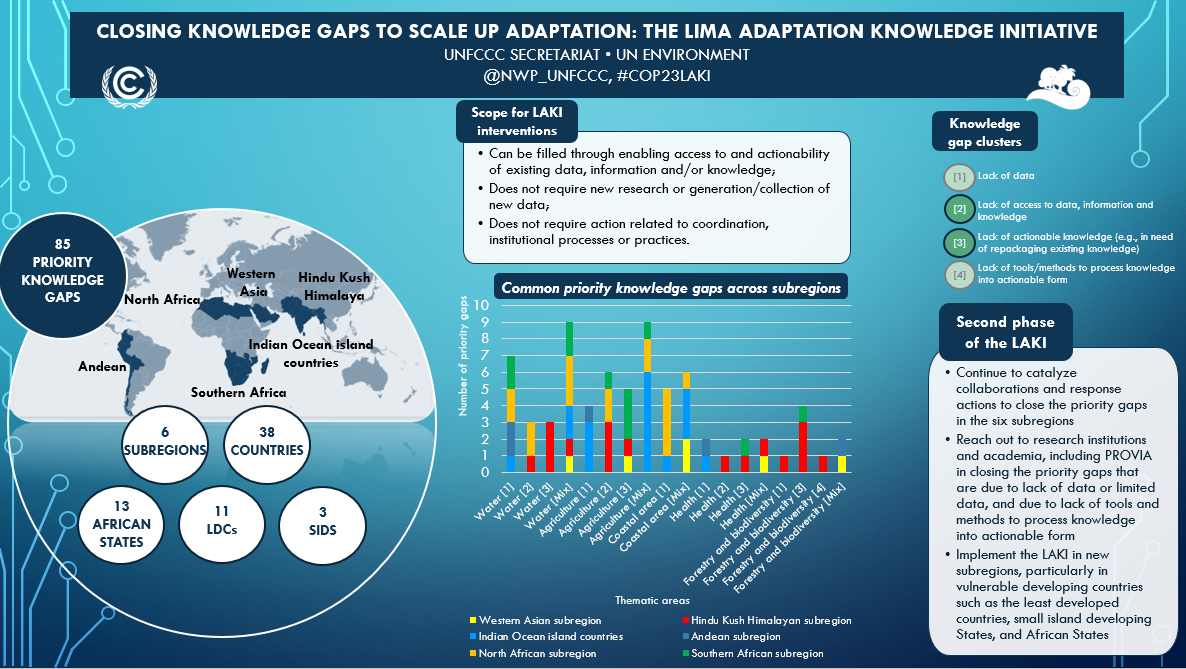On November 9th, the UNFCCC secretariat and UN Environment co-convened a COP 23 side event to share the outcomes of the first phase of the LAKI and discuss the next phase of the LAKI’s knowledge-for-action implementation.
The overarching goal was to gain political and material support towards the second phase of the LAKI and towards implementing action identified during the first phase.
Objectives:
1. Raise visibility of the LAKI as one of the modalities under the Nairobi work programme (NWP) in the following ways:
- Showcase the multi-partner collaboration between the UNFCCC secretariat, UN Environment, subregional entities, research institutions, academia, the COP Presidency and the Chair of the SBSTA;
- Demonstrate NWP’s role in identifying priority knowledge gaps and in catalyzing actions to remove knowledge barriers through both a “robust” knowledge assessment process and successful collaborative partnership;
- Highlight the systematic LAKI process in producing a credible list of priority knowledge gaps. This approach generates ownership and legitimacy for the outcome and hence triggers or realigns the supply side on knowledge, financial and in-kind support to be channeled to closing these gaps.
2. Discuss the second phase of the LAKI:
- Note the successful completion of the first phase in six subregions;
- Discuss implementation of a second phase of the LAKI that would include the following aspects:
- Continue catalyzing collaboration and the implementation of response actions to close the priority knowledge gaps in the context of the six subregions covered in the first phase of the initiative; and
- Implement the LAKI in new subregions, particularly in vulnerable developing countries including least developed countries, small island developing States and African States.
In 2014, at COP20 in Lima, Peru, the LAKI was endorsed and launched by the Parties of the UNFCCC to overcome knowledge barriers. Three years later, the initiative has been successfully implemented in six subregions, covering a total of 38 countries and in doing so, has identified 85 priority knowledge gaps (see the LAKI brochure here).

These knowledge gaps, whether it’s the absence of knowledge, lack of access to locally usable knowledge or lack of appropriate tools and methods to process knowledge into actionable form, constitute formidable challenges to successful climate change adaptation actions.
The event was introduced by Dr. Youssef Nassef, Director of the Adaptation Programme at the secretariat, which then allowed for a constructive dialogue among scientists, policymakers and practitioners. Dr. Barney Dickson, head of the Climate Change Adaptation Unit at UN Environment, noted the aspects of the LAKI that worked well, including:
1. the multi-stakeholder partnership between his organization, the UNFCCC secretariat, subregional entities and local experts,
2. the identification of knowledge gaps at the subregional level, and
3. the application of a rigorous and consistent methodology in identifying and prioritizing knowledge gaps.
He encouraged more actions during the second phase of the LAKI to fill the knowledge gaps discerned so far.
During the facilitated dialogue segment of the event, the panelists acknowledged the importance of the LAKI and its potential role in supporting the national adaptation planning process. In recognition of the diverse knowledge users ranging from local farmers in rural communities to national adaptation planners and decision makers, the panel recommended the use of various tools and communication channels, such as weADAPT and PROVIA to promote equal knowledge access. The panel also noted the helpfulness of the LAKI in unlocking adaptation finance by identifying specific priority knowledge gaps to initiate the development of plans to close these gaps.
Following a panel discussion, interventions were sought from the floor. Participants addressed, among others the urgency and importance of recognizing:
1. impoverished rural communities in the mountainous regions, which is often not reflected in national level data and development planning;
2. the ecological boundaries rather than human-defined administrative boundaries when selecting subregions to work with;
3. the role of traditional knowledge in the LAKI; and
4. the need to enhance the linkage between data collection and application.
To learn about adaptation knowledge gaps in the water sector, the second biggest group of knowledge gaps across all subregions, this
interview with the Alliance for Global Water Adaptation (AGWA), one of the NWP's partner organization, will help you to find out more. For further information you can also take a look at the
LAKI brochure or read the detailed reports of the priority-setting workshops on the
LAKI webpage.